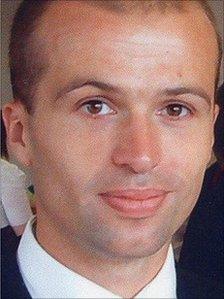'Unexplained' DNA on bag containing dead MI6 spy Gareth Williams
- Published
The body of Gareth Williams was found locked in the bag in the bath of his London flat
Specks of unexplained DNA were found on the holdall containing the curled-up body of MI6 spy Gareth Williams, his inquest has heard.
The body of Mr Williams, 31, originally from Anglesey, was found locked in the bag in the bath of his London flat.
Det Ch Insp Jackie Sebire said "two minor components of another contributor's DNA" were found on the zip toggle and padlock.
She said it was her opinion "that a third party had been involved".
Mr Williams's death has puzzled Scotland Yard detectives who have been unable to determine a cause of death or establish whether he had locked himself into the bag.
But Det Ch Insp Sebire, who is leading the investigation, said: "My thought or my opinion since I went into the scene is that a third party had been involved in the death or by putting the body in the bag."
The fact the DNA had been found meant there remained "future work that needs to be done," she said.
But she added the vast majority had already been carried out and there was "limited scope" for further forensic discoveries.
Police video
Westminster Coroner's Court was shown a video of what detectives saw as they arrived at his flat on 23 August 2010.
There was a cutting from the Observer newspaper about the top five regrets of the dying, make-up and a red wig.
In his bedroom, clothes were folded on the bed but a bathrobe and duvet cover were strewn on the floor, which coroner Fiona Wilcox said was "incongruous" in an otherwise tidy flat.
The film of the en suite bathroom shows the red North Face bag, showing bulges from his limbs inside, and a brass padlock locking two zips together from the outside.
The inquest was shown a graphic of the padlock and how it would have had to have been twisted to get through two eyelets of the zip and closed.
Det Ch Insp Sebire said she would have expected to find fingerprints left by Mr Williams on the bathroom floortiles. The spy had also not damaged the bag or injured his hands, she added.
She said there were no signs of distress to the body, which was curled in the foetal position.
"His face was very calm. His hands were resting on his chest," she added.
Two keys that would have unlocked the padlock were found under Mr Williams's buttocks, but there were no signs he had tried to get out of the bag.
Forensic evidence included a spot of Mr Williams' blood which the detective said could have dated from around the time he went missing or could be older.
Det Ch Insp Sebire said the inquiry had explored all possibilities over 21 months. "It was a very extensive inquiry. We have looked at all aspects of it."
She said there was no evidence that the bag or the flat had been cleaned to destroy evidence.
'Entirely relaxed'
Police also found female clothing worth an estimated £20,000 which appeared unworn and had been collected since 2008.
It included 26 pairs of shoes and boots, mainly bearing designer labels such as Christian Louboutin, Stella McCartney, Christian Dior and Chloe.

Mr Williams's colleagues from MI6 and GCHQ are due to give evidence
But Sian Jones, a friend since childhood, said she did not believe he was a transvestite and they were most likely gifts for her or his sister.
She said: "I feel like he would have been able to confide in me... and I would not have judged him."
Earlier, CCTV footage of Mr Williams on the days before he died was shown at the inquest, in which he looked relax and did not appear to being followed.
He is shown shopping in department stores around central London including Harrods and Selfridges from 11 to 15 August, with the final image capturing him entering Alderney Street, where he lived.
Mr Williams was due back to work the next day, 16 August, but the alarm was not raised until 23 August when his body was found.
Dr Wilcox told a pre-inquest hearing in March that whether the codebreaker was able to lock himself in the bag would be "at the very heart" of the inquest.
Mr Williams's family believe a third party was present at his death or later destroyed evidence.
- Published8 May 2012
- Published30 March 2012
- Published5 April 2011
- Published22 December 2010
- Published25 August 2010